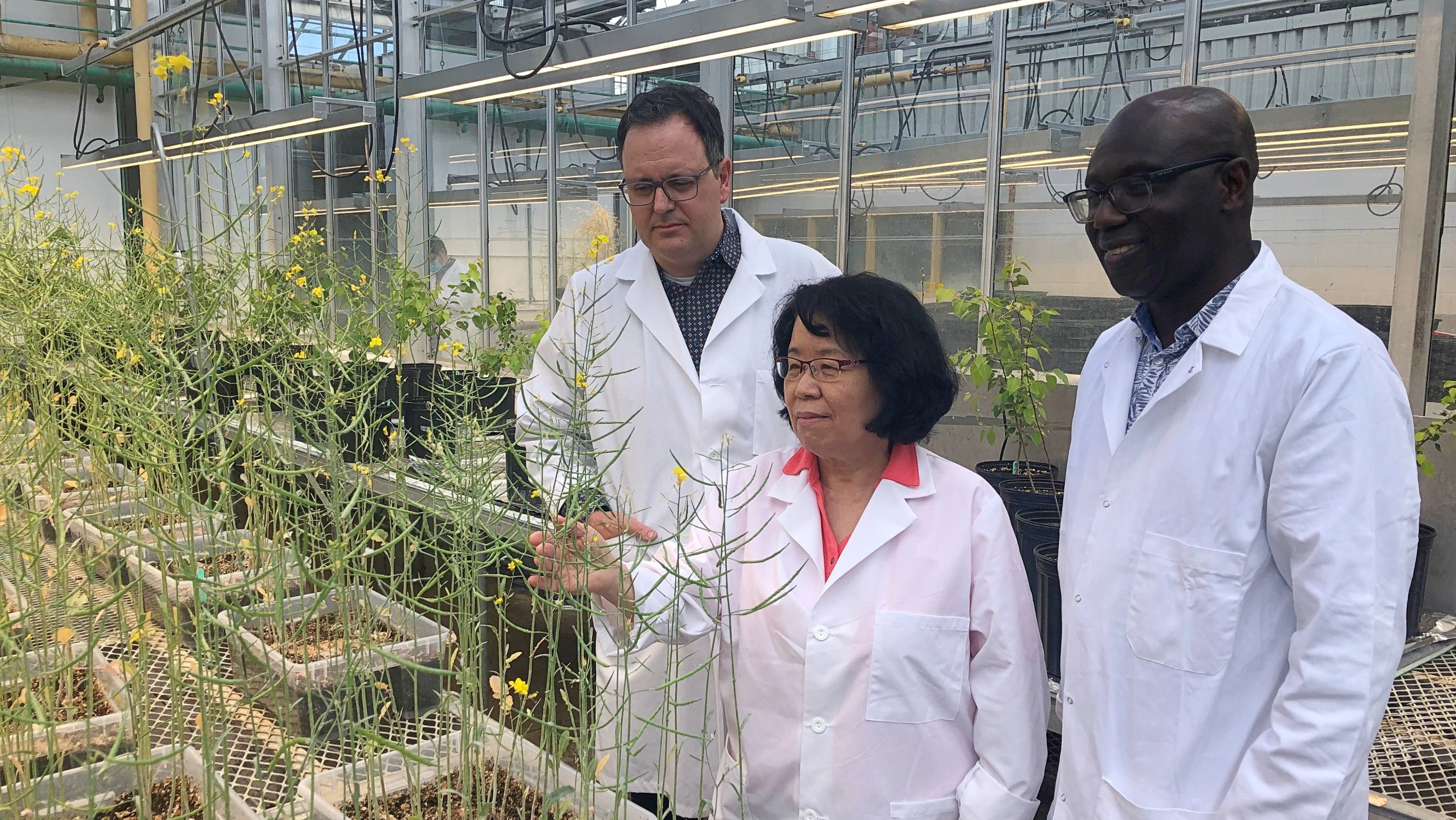Alberta, Canada
June 22, 2022
Researchers team up with agriculture company to help battle new strains of the crop-damaging disease and train new plant scientists
 (From left) Stephen Strelkov, Sheau-Fang Hwang and Rudolph Fredua-Agyeman examine diseased canola plants. The researchers are teaming up with agriculture company BASF to identify new ways of boosting clubroot resistance in canola. (Photo: Supplied)
(From left) Stephen Strelkov, Sheau-Fang Hwang and Rudolph Fredua-Agyeman examine diseased canola plants. The researchers are teaming up with agriculture company BASF to identify new ways of boosting clubroot resistance in canola. (Photo: Supplied)
A $1.25-million research project is tackling clubroot resistance in canola, to help battle new strains of the crop-damaging pathogen.
Funded by agriculture company BASF, University of Alberta plant scientists Stephen Strelkov and Sheau-Fang Hwang will work to identify new sources of pathogen resistance that can be bred into canola seeds.
New strains of clubroot, a soil-borne disease that attacks the roots of the canola plant, have been identified in more than 300 fields across Alberta.
“These strains are particularly concerning because they can overcome disease resistance in existing cultivars, are increasing and could eventually become a Prairie-wide challenge,” says Strelkov, a professor in the Faculty of Agricultural, Life & Environmental Sciences.
Building a diversity of resistance
In the comprehensive five-year project, researchers will explore and mine 30 varieties of canola and close relatives like cabbage for clubroot resistance, as well as pathogen material the U of A has extensively collected over the years. The varieties were chosen for their promise in preliminary testing done at the U of A, where they’d proven resistant to a diverse set of pathotypes. Plant material held by BASF will also be analyzed and compared with U of A material, and cross-bred if necessary, to introduce new resistance genes.
“We want to test the plant material and try to characterize what resistance genes are present and how effective they are, to help identify those that could help protect against some of the most important new strains of the pathogen,” Strelkov says.
The research may also lead to new resistance genes that are effective against clubroot pathotypes already controlled by other resistance sources, Strelkov notes.
“If one type of resistance breaks down, the other may still be effective, since it has a different genetic basis. That helps maintain a diversity of resistance that farmers can add to their toolkit for managing clubroot more sustainably.”
Part of an integrated approach
Any new genes that are developed will be provided to BASF to breed and offer new clubroot-resistant cultivars to its clients.
“By partnering in our efforts to enhance our research and better understand how clubroot is currently impacting canola fields across Western Canada, we can provide growers with new ways to approach existing solutions or bring novel and advanced tools to market,” says Stewart Brandt, head of global oilseed breeding at BASF.
“This will not only play a critical role in helping growers achieve higher yields but will also enable us to shape a brighter future for Canadian agriculture for generations to come.”
The potential is strong to ultimately build a more resistant canola plant, Strelkov believes.
“There seems to be good resistance in some of the plant material we’ll be working with, and we're confident we are going to find some good solutions.”
Producers will still need to manage clubroot with an “integrated approach” including methods such as crop rotation, soil supplements and sanitizing machinery, Hwang says.
“But combining those strategies with new resistant canola varieties adds an extra layer of protection for long-term, sustainable clubroot control,” she adds.
The research, running until 2026, will also provide opportunities for a post-doctoral fellow as well as U of A graduate and undergraduate students to work in plant science, helping to increase capacity in the field, Strelkov adds.
“There’s a lot of need for people who can work in plant pathology and crop improvement, and who know canola, clubroot and related diseases.”